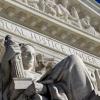Fair Share Fee Legal says US Supreme Court
The US Supreme Court announced that it had reached a 4-4 tie in the Friedrichs case that challenged the legality of allowing unions to charge an agency or fair share fee to non-members. The tie upholds a lower court decision that recognizes the constitutionality of the agency fee system, but does not prevent similar cases from making their way through the federal courts in the coming years. In issuing a 4-4 opinion in Friedrichs v. California Teachers Association, the U.S. Supreme Court today rejected an attempt by wealthy special interests to restrict opportunities for America’s teachers, firefighters, police officers, nurses and other public employees who provide our vital services for our communities to have a voice at work and join together to build a better future for their families.
Rosa Pavanelli, General Secretary of Public Services International (PSI) said "in a time when public service workers are under attack, the Supreme Court rule is an important statement that their right to organise and collectively represent cannot be stripped and are part of the fundamental workers’ rights. It is an important lesson that all the trade union movement can learn from, it is to say, that unions' unity together with workers' unity can defeat the greed of those who have the power of money, but not the power of people".
The Friedrichs case represented a strategic threat to public sector workers, but this momentary victory does not eliminate this threat. In effect, the Supreme Courts’ inability to form a majority decision provides a reprieve of sorts for public sector unions who were bracing for the worst-case scenario. United States public employees who don’t join a union cannot be required to pay for the union’s political activities, but in many states they can be charged an “agency” or “fair share” fee to pay for other costs that the union incurs, including grievance representation and collective bargaining. The recent death of Justice Antonin Scalia, whose vote would have likely reversed the legal precedent to rule that the agency fee system was unconstitutional, still leaves the prospect of future court challenges.

